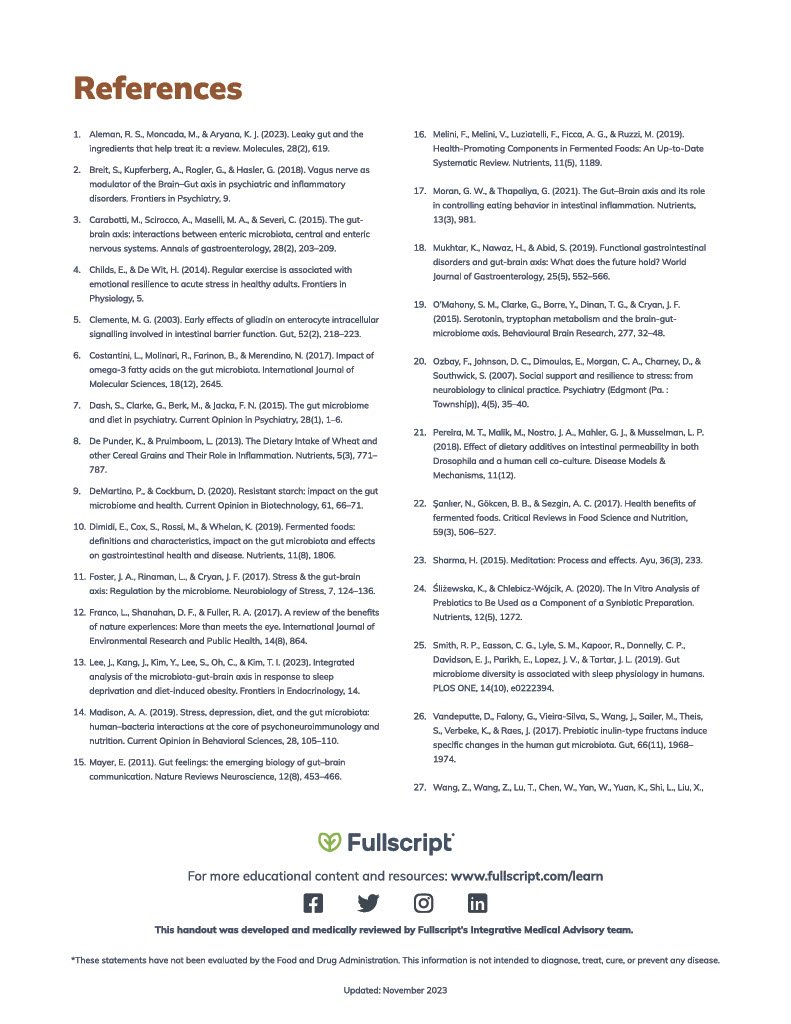The gut-brain axis
The gut-brain axis is a two-directional communication network that links the brain and the gut. This network plays an important role in controlling digestion, emotions, hunger, sleep, and more. The gut-brain axis is composed of the nervous system (central nervous system, enteric nervous system, autonomic nervous system), immune system or tissue (gut-associated lymphoid tissue), and hormonal system (hypothalamic-pituitary-adrenal axis). Furthermore, the vagus nerve is an essential component of the gut-brain axis as it connects the gut and brain.
Disorders of the gut-brain axis
Poor diet, long-term stress, poor sleep, and other lifestyle factors can negatively affect gut health and impair the communication pathways between your gut and brain. This can contribute to several issues, including:
Anxiety
Constipation
Depression
Diarrhea
Dysphagia (trouble swallowing)
Gastroesophageal reflux disease (GERD)
Indigestion (heartburn)
Irritable bowel syndrome
(IBS) Loss of bowel control
Stress
Tips for supporting the gut-brain axis
Eliminate inflammatory food groups
Eliminate certain foods including gluten-containing grains (like wheat, barley, and rye), cow’s dairy, and refined sugars that may contribute to increased gut permeability and inflammation.
Did you know? Gut permeability, sometimes referred to as leaky gut, occurs when small gaps form in the lining of the small intestine that allow large particles like undigested food to pass through the gut into the bloodstream.
Include fermented foods in your diet
Probiotics are beneficial, living microorganisms that help promote a healthy gut. Several fermented foods and beverages contain naturally occurring probiotics, including:
Fermented vegetables (like sauerkraut and kimchi)
Fermented dairy products from sheep or goats (like kefir and yogurt)
Fermented tea (like kombucha)
Include prebiotic foods in your diet
Prebiotics, found in various plant foods, are a group of non-digestible fibrous carbohydrates. Prebiotics are fermented by microorganisms in the gastrointestinal tract, known as gut microbiota, and help promote a healthy gut.
Examples of naturally occurring prebiotics and their sources include:
Prebiotic inulin: asparagus, garlic, Jerusalem artichoke, jicama, onion
Prebiotic arabinogalactans: carrots, leeks, radishes, tomatoes, turmeric
Resistant starches: cooked beans/legumes, sweet potato, yam, pumpkin, potato, cooked rice
Consume healthy fats
Research suggests that consuming healthy fats, including omega-3 fatty acids (fish oil), can support the intestinal tract and the gut microbiota, which is a collection of bacteria, viruses, and fungi that live in the digestive system. This can have a positive influence on the gut-brain axis.
Sources of healthy fats include:
Avocados
Coconut oil
Extra-virgin olive oil
Flaxseed oil
Hemp oil
Nuts and seeds
Get enough sleep
Getting enough quality sleep is important for the health and diversity of your gut microbiome, which also influences the health of your gut-brain axis. Adults should aim for about seven to eight hours of qood-quality sleep per night.
Manage stress levels
Chronic (long-term) stress can negatively impact the overall diversity of bacteria in your gut. Manage your stress levels by:
Finding relaxation techniques you enjoy, such as meditation or deep breathing
Participating in regular physical activities
Reaching out to friends or loved ones
Spending time in nature
Talking to a mental health professional
Taking adaptogens when discussed as part of your plan with your health professional
Consider targeted supplementation
In addition to consuming a healthy diet, targeted supplementation may help improve gut health when advised by your integrative healthcare practitioner.
*These statements have not been evaluated by the Food and Drug Administration. This information is not intended to diagnose, treat, cure, or prevent any disease.
*The OHM Life would like to thank Fullscript for their contribution of this article.
References




